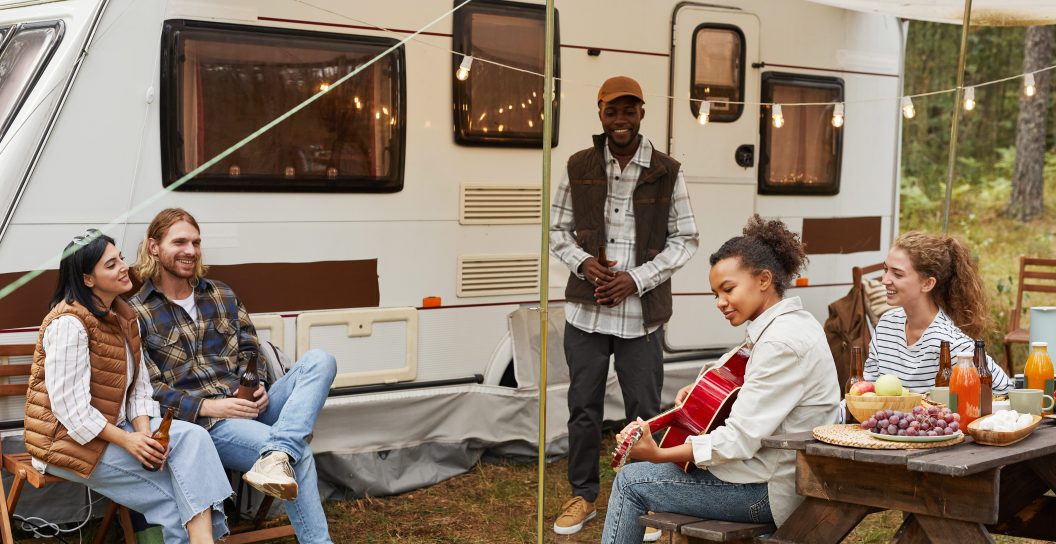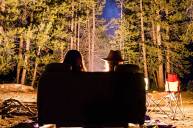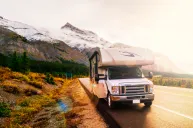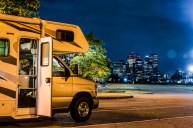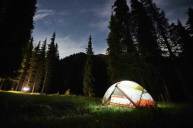When most people picture camping in an RV, they envision having all the modern conveniences of home magically transported on four wheels to a gorgeous natural location. But RVing doesn't always include having access to hookups, like water and electricity, especially if you prefer to camp in an area that isn't very crowded. With 11.2 million RV-owning households hitting KOA campsites and RV resorts annually, that can be a difficult ask, though not impossible—thanks to dry camping or, as it's commonly known, boondocking.
What is RV Boondocking?
Put simply, RV boondocking is camping in an RV without connections to water, electricity, or sewer. Typically, boondock camping spots are located outside of developed campgrounds, which can be a huge part of the fun—not to mention a cheap way to RV. Also, if you're not worried about needing to find hookups, you can venture out to more isolated locations and be one with nature for a few nights.
What to Expect When RV Boondocking
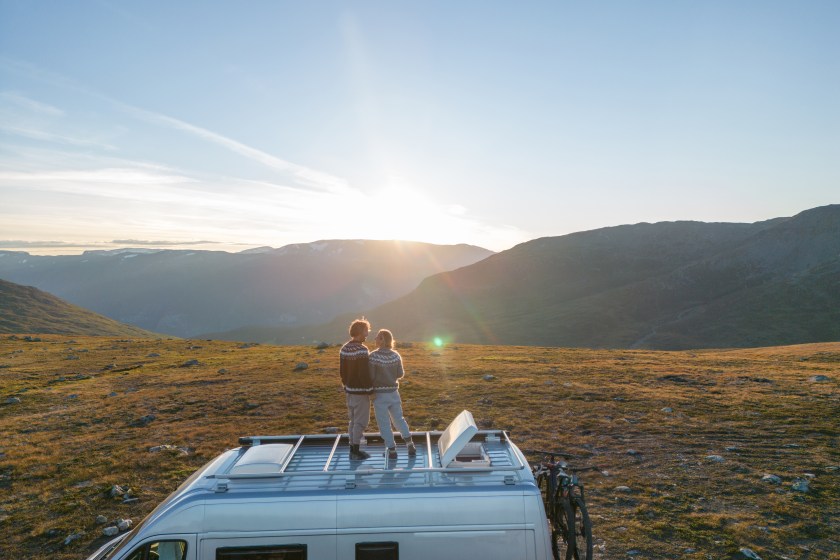
Getty Images, MystockImages
Seasoned RV campers Gabe and Rocio Rivero have been boondocking in their Thor Motor Coach Sequence for the past four years, traveling with their two dogs, Wilson and Journey, in tow. For them, the experience captures the essence of being an outdoorsperson.
"First, we absolutely love the feeling of being fully immersed in nature. Some of the most beautiful places we've visited have been in the middle of nowhere," the Riveros say. "Second, the wide open spaces are great for our two dogs. Third, campgrounds can get crowded and cost upwards of $100 per night, depending on the location. But with boondocking, you typically don't have to pay to camp, and you rarely have any neighbors nearby."
However, planning the trip may take a little extra preparation time, especially when it comes to mapping out the trip. Gabriel and Rocio have found a method that works well for them.
"Start by having a rough idea of where you want to stay and what you want to see," they say. "Once we have an idea of where we want to be and what we want to see, we begin to create a route for the drive. Depending on what RV you have, there are several RV-specific GPS apps that can help you determine the best route based on the length, height, and width of your RV. You should always take pictures or screenshots of the driving route to and from your boondocking spot. This way, you'll have a backup in case you find yourself without any cell service."
How to Pack an RV for Boondocking
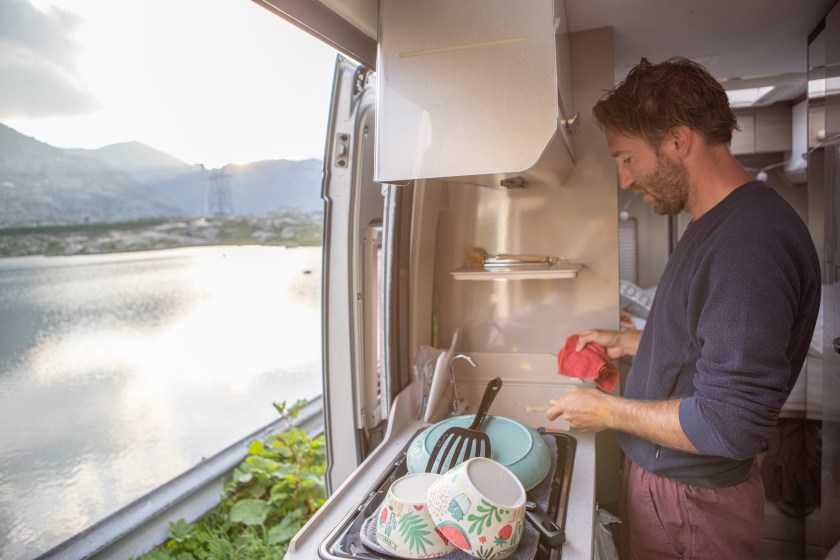
Getty Images, swissmediavision
The biggest part of RV boondocking is being prepared, but what you bring along is a little different from a regular trip. You won't be able to rely on the amenities that most RV parks offer, which is why you'll have to supplement your usual RV packing list and to-dos. Before heading out, head to the dump station to empty all of your tanks. You'll likely not have access to a water source, so fill up your freshwater tank. Then take your rig home and pack up everything else you'll need.
"First, make sure you have all the essentials, including enough food and water to last the length of your stay, as well as medical supplies and a roadside emergency kit," the Riveros say.
Because you'll be outside a designated campground, you'll need a power source of some kind if you want full use of your RV. For that, you have a few options. If you have a motorhome, a generator is already apart of your rig, but in a trailer, camper, or fifth wheel, you'll have to decide if you want to bring your own. Generators provide plenty of power to charge up phones and laptops, and power your appliances. However, they take gas—another thing to pack—and they can be very noisy. Generator use is also banned from some sites because they create noise pollution that interferes with the ambiance of wild camping.
Outfitting an RV with solar panels is a great option, particularly for sites that do not allow generators. They're used in tandem with an inverter—which converts UV radiation into usable current—and batteries, so you'll have power after dark. The biggest downside is that you need direct sun to successfully make this option work. Planning is key. If the weather calls for overcast skies or you'll be camping under thick tree cover, a solar system may not be the best option.
If your cooking stove or heat source needs propane, add filling your tank to your packing checklist. Even if your rig doesn't have a kitchen, it never hurts to bring a propane camping stove along. They can be very useful in a pinch.
Safety is always a priority when camping, but is even more important when you are heading out to the boonies. "Be sure and let someone know what your itinerary is before you leave," the Riveros say. "Cell service can be spotty when boondocking, so it's good to keep a friend or family member informed of when you plan to return." You may also opt to bring along a satellite messenger device or a sat phone, just in case of emergency when you're off the grid.
Where to go RV Boondocking
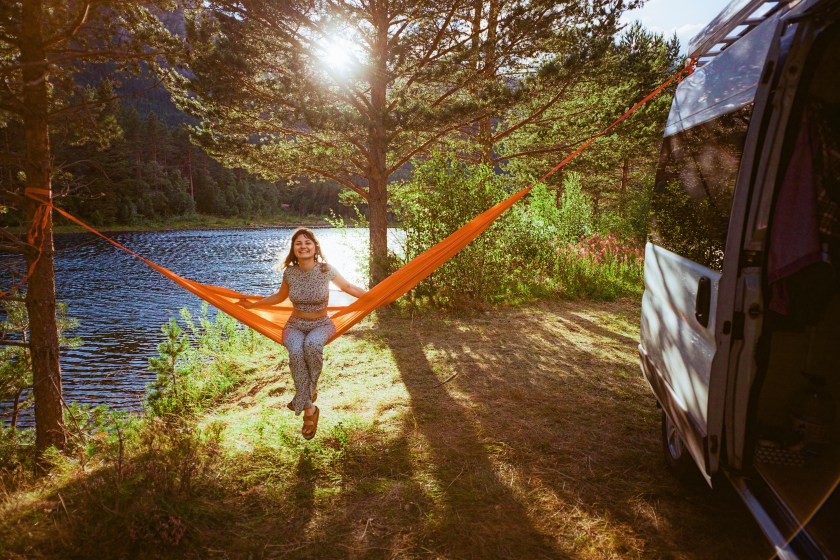
Getty Images, Oleh_Slobodeniuk
Once you've figured out the how and when go, the last question is where. Finding locations off the beaten path where off-grid RV camping is allowed sounds difficult, but a plethora of boondocking sites abound if you know how to look.
Not every boondock has to be an Instagram-worthy locale, though. In a pinch, your free camping site could be the parking lot of a local business—as long as overnight parking is permitted. The last thing you want is your trailer or motorhome being towed in the middle of the night! Walmart, Cracker Barrel, and Cabela's are typically known for having overnight camping spots for RVs.
Rest areas and truck stops are often safe spots to stay overnight as you're road tripping to your final destination. When it comes to choosing your ideal camping experience, the Riveras have several suggestions.
"If you're looking for a spot without hook-ups but still want some people around for security, then state parks and national forests are ideal for boondocking newbies," they say. "For completely off-grid locations, much of the land outside national parks is perfect for more remote camping. Utah has endless public land just outside of its five national parks. And the same goes for Grand Teton National Park in Wyoming."
Most of the time, boondocking is free. Agencies such as the National Forest Service, Department of Fish and Wildlife, and Bureau of Land Management allow dispersed camping or on some of the lands under their control. Some BLM lands even allow stays of up to 14 days.
To find locations where you can enjoy dispersed camping, along with the rules and regulations to go along with it, check out Boondockers Welcome, Harvest Hosts, Campendium, Campnado, Bureau of Land Management, and the U.S. Forest Service.
